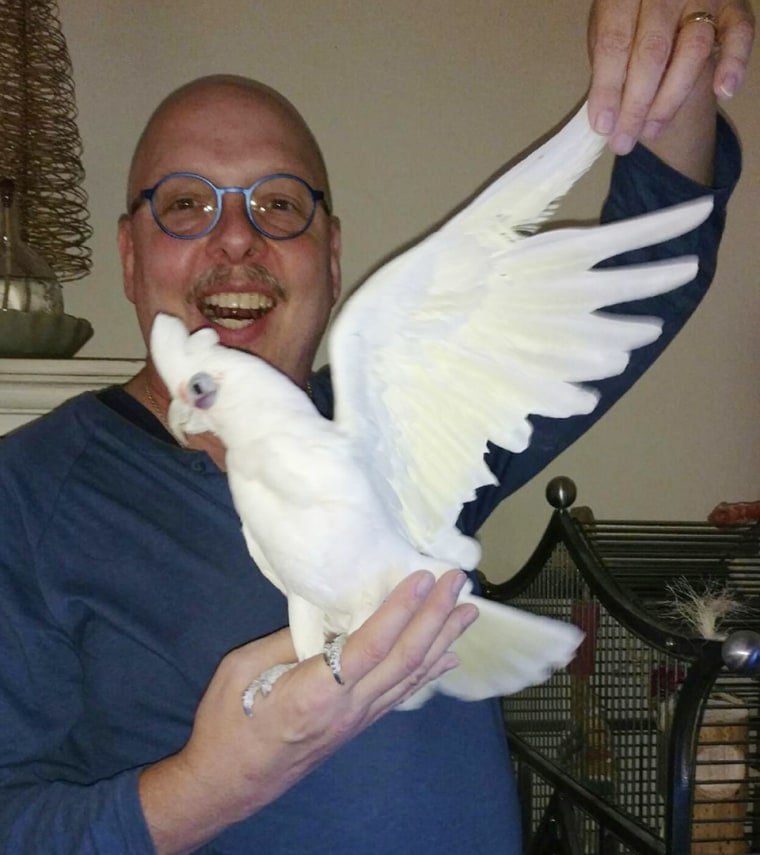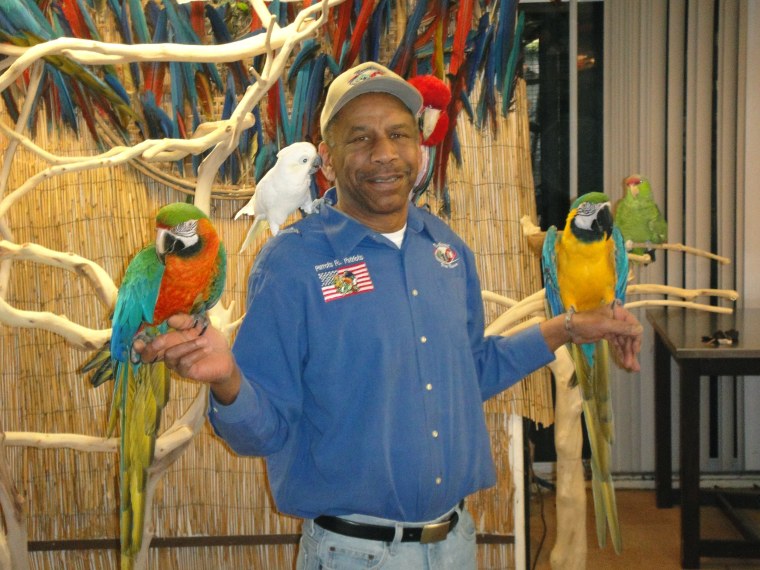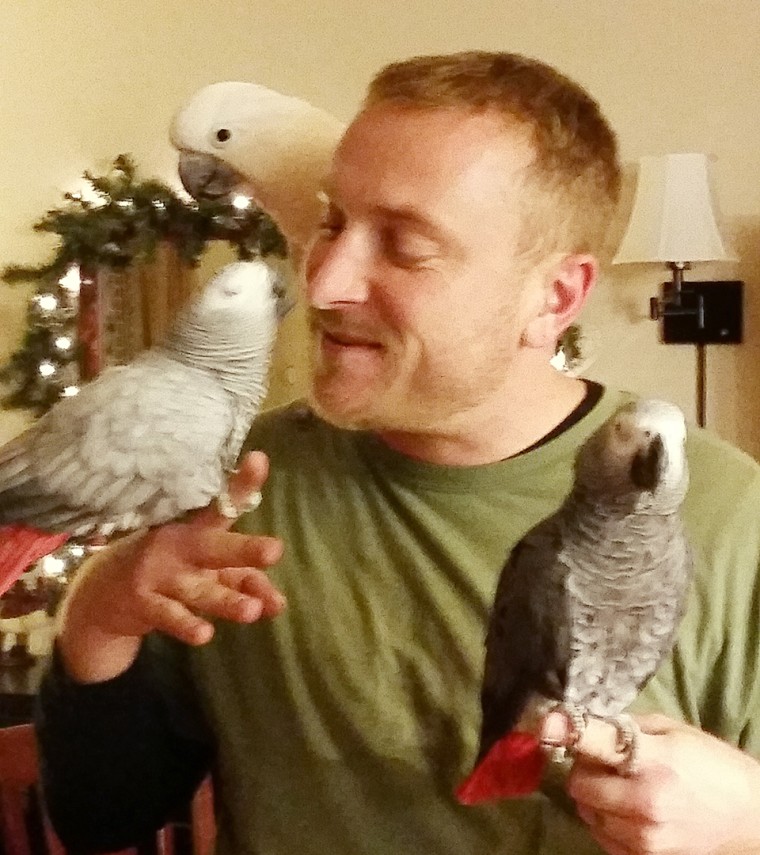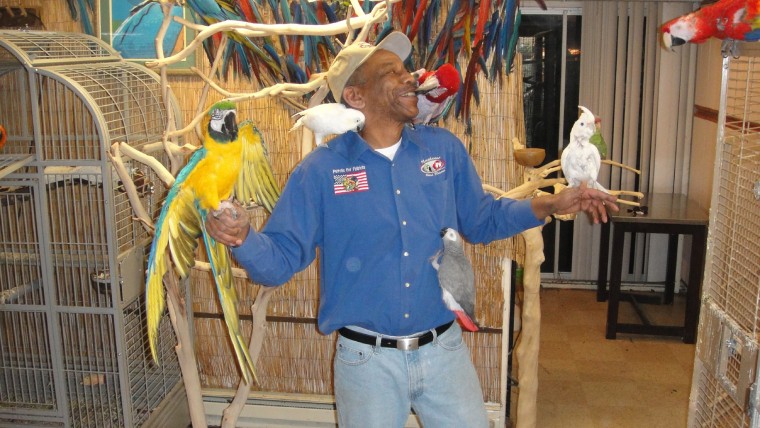For decades after leaving the Marines, Douglas Ladd of Portland, Oregon, struggled with anger and other emotional issues.
Now he's found something to help: a bare-eyed cockatoo named Cleopatra.
“You can’t get mad at her because she’s a bird,” Ladd, 62, told TODAY. “People you can get mad at, because they’re supposed to know better.”

Ladd is one of many veterans turning to birds as therapy or emotional support animals thanks to Parrots for Patriots, a program that pairs abandoned birds with veterans in need throughout the Northwest. Birds are helpful because they provide routine and responsibility that some veterans — especially those who have post-traumatic stress disorder — feel they lack after leaving service, founder Chris Driggins said.
RELATED: At this special ranch, veterans find hope, healing after wounds of war
“With PTSD or any other type of mental disorder, your life is a little confused,” Driggins, of Vancouver, Washington, told TODAY. “Birds demand normalcy, and certain birds are very needy. They help you fall into a pattern — get up at this time, give me a treat at this time, give me TLC. Then you find yourself in a normal routine again. You don’t have those restless nights where you’re up all night worrying, because the bird has exhausted you. And if you do get up in the middle of the night, the bird will understand. There are so many things that birds can do for you that no other animal can.”
Sure enough, the intelligence of birds, particularly parrots, has been highly documented. In a popular TED Talk from 2006, an African grey parrot named Einstein demonstrates an impressive vocabulary and the ability to respond to questions. (He does a great Matthew McConaughey impression, too.)

Parrots also live longer than most other pets, such as cats or dogs, which partly explains why there are so many abandoned birds, said Driggins, who also runs Northwest Bird Rescue.
“The birds outlive the humans is what it boils down to,” he said, adding that some parrots can live to around 80 years.
RELATED: How service dogs help veterans with PTSD heal, embrace life again
That’s exactly why veteran Paul Thomas, who served in the Air Force from 1999 to 2003, turned to birds.
“I got tired of burying my dogs,” Thomas, 36, told TODAY. “(For veterans), that loss can be hard. It brings up a lot of things.”

Thomas, who lives in Battle Ground, Washington, now has three birds, including an African grey named Sabrina he got through Parrots for Patriots.
Driggins has placed around 90 birds — many of them neglected or abused — with veterans since launching Parrots for Patriots in 2015. One of his recent recipients is David Haro, a Navy veteran in Eugene, Oregon, who has PTSD.
As the 48-year-old sees it, the benefit is simple: “Pets give me something to do,” he told TODAY.
“Animals are non-judgmental,” Haro, who also has a service dog, added. “They’re there in your dark times and in your good times. They love you unconditionally.”
Driggins is not alone in realizing the powerful connection possible between veterans and birds. At Serenity Park, a parrot sanctuary in Los Angeles, veterans interact with rescued birds but don’t take them home.
RELATED: Amputee cat helps a veteran with PTSD find 'purpose beyond her despair'
Driggins, an Army veteran, goes a step further. Veterans must fill out a questionnaire and take an educational class before being matched with a bird. They also meet the bird multiple times before Driggins decides whether or not it’s a match.
“It’s really up to the bird,” he said.
So far, his matchmaking has been on point, and Driggins finds the veterans and birds form lasting bonds.

“If I’m in the other room and (Cleopatra) keeps squawking, I tell her, ‘I see you, I see you,’ and when she gets tired of me saying that, she says, ‘Whatever,’ because she wants me to come back to the room,” Ladd said of his bird. “Out of the cage, she’ll climb up my pant leg. She gets on my shoulder and I can walk around and do things with her. If I go to the dining room, I put her on the back of a chair.”
Thomas has forged a similar relationship with his birds.
“In the morning, they say ‘good morning,' at night, they say ‘good night,’” he said. “They can read you like a book. If you’re out of place, they know it, and try to make it better. I’ll be kind of grumpy and sure enough, one of my birds will make a loud fart noise. I know it sounds silly, but you’re all bummed out and you hear a parrot fart? It’s hilarious.”